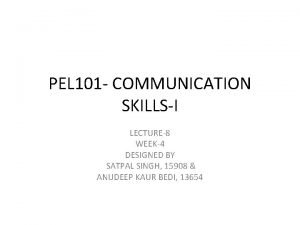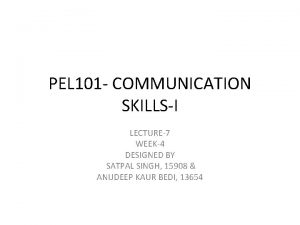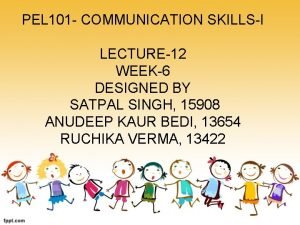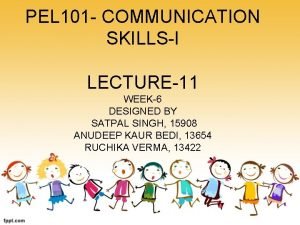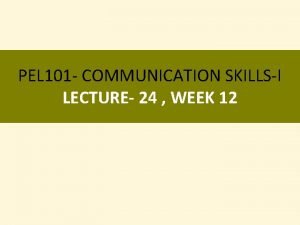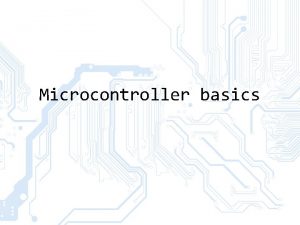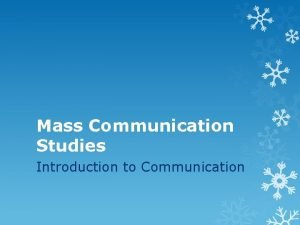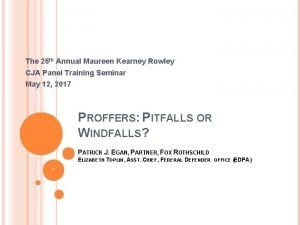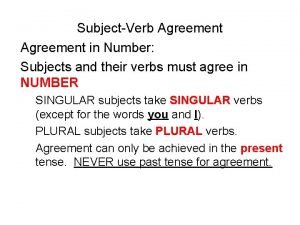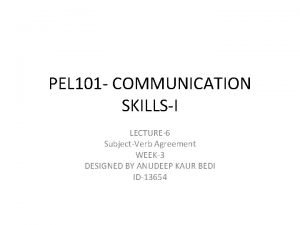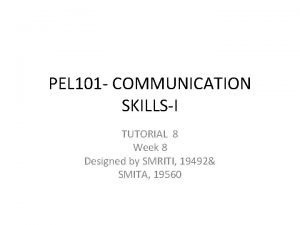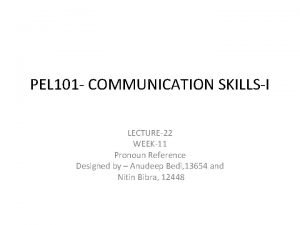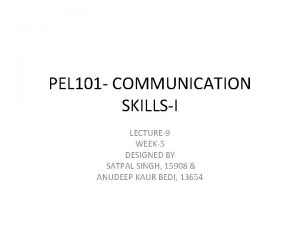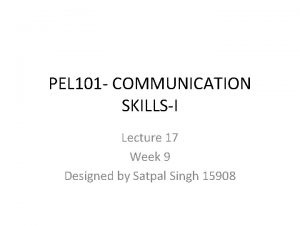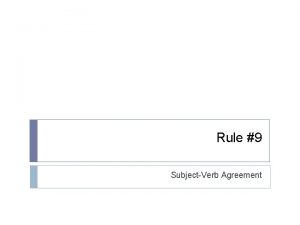PEL 101 COMMUNICATION SKILLSI LECTURE5 SubjectVerb Agreement WEEK3

PEL 101 - COMMUNICATION SKILLS-I LECTURE-5 Subject-Verb Agreement WEEK-3 DESIGNED BY ANUDEEP KAUR BEDI ID-13654

SUBJECT-VERB AGREEMENT • A sentence is made up of three parts. • SUBJECT: What or whom the sentence is about. • VERB: What the subject did or is. • The REST: Everything else in the sentence.

SUBJECT-VERB AGREEMENT • • • EXAMPLES Rachel talks on the phone during her break. Karen types on her computer every day. Iris changes her clothes to suit the weather. The private investigator is below average.

SUBJECT-VERB AGREEMENT • Subjects and verbs must agree in the following way: • SINGULAR subjects require SINGULAR verbs. • PLURAL subjects require PLURAL verbs.

SUBJECT-VERB AGREEMENT • Examples 1. Rachel understands the process very well. 2. The students understand the process very well. 3. Jared calls his manager every day. 4. The employees call their manager every day.

DID YOU SEE THAT? • SINGULAR VERBS end with –s • PLURAL VERBS don’t end with s?

Some pronouns are singular. • • • Someone Somebody Something Another Anybody Anyone Anything Nobody No one Nothing Everybody Everyone Everything Either Neither Each Much One

Some pronouns are plural. Examples: 1. Few students miss calculus lectures on Monday. 2. Several students know the answer. 3. Many are already raising their hands. 4. Others have not read the chapter.

Some pronouns can be either singular or plural • • • Some All Most None Half of

Underline the subject and verb in each sentence. Label the following sentences as S for singular or P for plural 1. Some of the meat is spoiled. 2. Some of the cookies have been eaten. 3. Most of the money is still in the safe. 4. Most of the coins have been stolen. 5. None of the cheerleaders are happy. 6. Half of the assignments are late

ANSWERS 1. Some of the meat is spoiled. S 2. Some of the cookies have been eaten. P 3. Most of the money is still in the safe. S 4. Most of the coins have been stolen. P 5. None of the cheerleaders are happy. P 6. Half of the assignments are late. P

EXERCISE- Identify the subject of the sentence by underlining it once. Then underline the correct verb for that subject. 1. Somebody (move, moves) my morning paper nearly every morning. 2. Both (argue, argues) on the phone. 3. Some pizza (has, have) been saved for later. 4. Half of the answers(was, were) correct. 5. Half of the assignment(is, are) already complete. 6. Most of the ice (melt, melts) in the spring. 7. Neither of the employers who interviewed me last week (has, have) called with the results of their interviews. 8. A small group of parents (hope, hopes) to meet on Sunday to discuss travel arrangements for their seniors touring Southeast Asia in the fall.

ANSWERS 1. Somebody (move, moves) my morning paper nearly every morning. 2. Both(argue, argues) on the phone. 3. Some pizza(has, have) been saved for later. 4. Half of the answers(was, were) correct. 5. Half of the assignment (is, are) already complete. 6. Most of the ice (melt, melts) in the spring. 7. Neither of the employers who interviewed me last week (has, have) called with the results of their interviews. 8. A small group of parents (hope, hopes) to meet Sunday to discuss travel arrangements for their seniors touring Southeast Asia in the fall.

SUBJECT-VERB AGREEMENT • Subjects in the first and second person take plural verbs, as does the third person plural. • The third person singular takes a singular verb, as illustrated in the chart . Person Singular Plural First I eat We eat Second You eat Third He /She/it eats They eat The bird eats Birds eat below

SUBJECT-VERB AGREEMENT q. Example (singular subject): The cat lives on Lake Street. S V q. Example (plural subject): The cats live on Lake Street. S V

Indefinite pronouns as subjects • The following indefinite pronouns are singular and take singular verbs. anyone everyone someone either one anyone, everyone, someone, either one anybody everybody somebody neither no one anybody everybody somebody neither No one anything everything something another each

Examples 1)Everyone is anxious to meet the new boss. 2) Someone in the game was hurt. 3)Neither of the men is working. 4)Everyone has done his or her homework. 5) Somebody has left her purse 6) Each does a good deal of work around the office.

Indefinite pronouns as subjects The following pronouns are plural and take a plural verb Both Few Many Several Examples: 1) Both girls are pretty. 2)Several were encouraged to continue the discussion. 3) Few roses were still blooming.

Indefinite pronouns as subjects • Some indefinite pronouns may be either singular or plural: • with uncountable, use singular; • with countable, use plural. Some Any None All Most Example: Some of the sugar is on the floor. Some of the marbles are on the floor.

Indefinite pronouns as subjects Examples: All of the children were late. None of the engines are working. Most of the news is good. Most of the flowers were yellow.

EXERCISE-- Pick the correct verb form 1. Each of the girls (look-looks) good on skis. 6. Some members of the faculty (isare) present. 2. Everybody (was-were) asked to remain quiet. 7. Nobody in the class (has-have) the answer. 3. Neither of the men (is-are) here yet. 8. Each of the girls (observe-observes) all the regulations. 4. (Is-Are) each of the girls ready to leave? 9. All of the pizza (was-were) gone. 5. Several of the sheep (is-are) sick. 10. Most of the seats (was-were) taken.

ANSWERS 1)looks 2)was 3) is 4)is 5)are 6)are 7)has 8)observes 9 )was 10) were

SUBJECT-VERB AGREEMENT Collective Nouns (group, jury, crowd, team, etc. ) may be singular or plural, depending on meaning. When they refer to a group of people or things as one unit, they take a singular verb. When they refer to the individuals within a group, they take a plural verb.

Examples of collective nouns Audience Family Orchestra Band Team Committee Class Group Crowd Jury

Examples: of collective nouns both as singular and plural 1. The orchestra is playing a hit song. (Orchestra is considered as one unit—singular. ) 1 a. The orchestra were asked to give their musical backgrounds. (Orchestra is considered as separate individuals—plural) 2. The jury was reentering the courtroom. (acting as one unit) 2 a. The jury were discussing their opinions of the trial. (acting as individuals within a group)

Singular nouns though they appear plural The following nouns are singular, although they appear to be plural. As the subject of a sentence, they take a singular verb. Civics Athletics Genetics News Mumps Physics Politics Series Measles United States Economics Mathematics Example: Mumps is a disease of the salivary glands The News from the front is bad.

Plural in appearance and are plural nouns. . • Words such as glasses, pants, pliers, and scissors are regarded as plural (and require plural verbs) Examples: 1) My glasses were on the bed. 2) My pants were torn. 3) A pair of plaid trousers is in the • unless they're preceded the closet. phrase pair of (in which case the word pair becomes the 4) The pliers are in the toolbox. subject). 5) The pair of pliers is in the toolbox. 6) The pair of scissors is on the table.

EXERCISE--- Circle the correct verb in each of the sentences below. 1. Margo and her parents (visit-visits) each other often. 2. Either the cups or the glasses (are-is) in the dishwasher. 3. Vern and Fred (need-needs) a ride to work. 4. There (is-are) a dog, a cat, and a bird in the garage. 5. Neither Matt nor his brothers (was-were) at the party. 6. Here into the main ring of the circus(come-comes) the trained elephants. 7. Either the workers or the boss (deliver-delivers) the merchandise. 8. The committee (work-works) hard for better schools.

EXERCISE 9. There (is-are) many things to do before the holidays. 10. The jury (was-were) polled for their verdicts. 11. Here (is-are) the nails you need for the projects. 12. Either Joyce or Ellen (was-were) here. 13. The United States (is-are) a country of contrast. 14. A magazine and a book (was-were) lying on the floor. 15. The family (is-are) occupied with their individual problems

ANSWERS 1)Visit 2)are 3)need 4) are 5)were 6)come 7)delivers 8)works 9) are 10)were 11)are 12)was 13) is 14)were 15)are

SOME Rules to remember A. Expressions of time, money, measurement, and weight are usually singular when the amount is considered one unit. EXAMPLES • Five dollars is (not are) too much to ask. • Ten days is (not are) not nearly enough time. B. Some nouns, while plural in form, are actually singular in meaning. Examples: • Mathematics is (not are) an easy subject for some people. • Physics is (not are) taught by Prof, Baldwin.

SUBJECT-VERB AGREEMENT C. Don’t and Doesn’t must agree with the subject. Use doesn’t after he, she, it. Examples: • Doesn’t he (not don’t) know how to sail? • They don’t (not doesn’t) make movies like that anymore.

EXERCISE-- Circle the correct verb in each of the sentences below. 1. Mumps (is-are) one of the most uncomfortable diseases. 2. One hundred dollars (is-are) not a lot of money to some people. 3. She (doesn’t-don’t) look very well today. 4. Twenty minutes (is-are) the amount of time it takes me to get home from work. 5. It (doesn’t-don’t) seem so cold today. 6. Gymnastics (is-are) easy for Angela. 7. Interesting news (is-are) what sells our paper. 8. A pound of cookies (cost-costs) about a dollar. 9. They (doesn’t-don’t) think they’ll win the game tonight. 10. He (don’t-doesn’t) speak very well.

ANSWERS 1. Is 2. is 3. doesn’t 4. is 5. doesn’t 6. is 7. Is 8. costs 9. don’t 10. doesn’t

PRACTICE EXERCISE-- Write the correct verb in the blank to the left of each sentence 1. ____ Everybody (was-were) asked to be quiet. 2. ____ In a marathon, few of the starters (finishes-finish) the race. 3. _____ Sixty days (is-are) not enough time to complete the project. 4. _____ All of the workers (is-are) receiving their bonus. 5. _______On our street (is-are) many tall trees. 6. ____ It (don’t-doesn’t) make any difference. 7. _______ The value of cars and motorcycles (has have) increased. 8. _______ The principal and her husband (is-are) honored guests. 9. _________ Either the pitcher or the base runners (waswere) caught napping. 10. _______ One of my friends (believe-believes) in E. S. P

11. _______ Have you ever heard the expression, “No news (isare) good news? ” 12. ____There (was-were) several dents in the car. 13. _______ Louise (doesn’t-don’t) want to drive that long distance. 14. ____ Either Luis or Horace (pay-pays) the bills in our house. 15. ____ A boy and a girl (were-was) here to see you. 16. ____ The box of apples (is-are) on the porch. 17. _______Some of the job applicants (is-are) expected to pass the difficult screening test. 18. _______The army (is-are) conducting maneuvers in March. 19. ______ Here (come-comes) the family now. 20. ____ Neither of us (is-are) going to work.

21. _______ (Doesn’t-Don’t) they know when to quit? 22. ____ Thirty minutes (is-are) the time limit for the test. 23. _______ Measles (is-are) a disease most children experience. 24. _______ The class (is-are) turning in their registration forms today. 25. ____ Beyond the mountains (is-are) a fertile valley.
- Slides: 37


